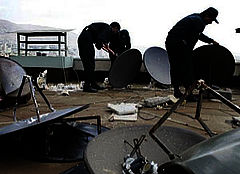Minister of Culture Concedes the Internet and Satellite Dishes Cannot be Removed
Iran’s minister of culture and Islamic guidance publicly conceded that cyberspace and banning satellite television receivers was impossible, and that efforts to accomplish these were futile. He instead proposed to manage public opinion rather than try to confront it.
Speaking at a two-day seminar to officials from the police in Tehran, minister of culture Ali Janati said the holding of such conferences indicated a change in how social issues were treated and a better understanding of the variables involved.
“Neither the borders of the country enable us to control the media nor internal legal arrangement prevent the flow of news from outside into the country,” he said. “If in the past we could control information by applying pressure on media managers, today the landscape has changed and this is not possible any longer.”
The official went even further and said social media networks such as Viber and Watsapp also could not be controlled and blocked from people.
“Today, there are some 9,000 television and satellite networks outside Iran over half of which can be received inside the country. At the same time, there are 170 Persian language satellite TV networks and over 870 million websites which grow by the hour which send news and information to their audiences. For example, 300 videos are downloaded onto You Tube every hour,” he explained, indicating the magnitude of the field for those who advocated controlling it by blocking access to them from Iran and for Iranian citizens.
His recommendation in dealing with this stream of information was to improve the quality of domestic media products. He said the best response was to use these very networks with domestically produced content.
He issued a warning by saying within the next two or three years every mobile telephone would have access to 2,000 satellite networks, negating the need for land-fixed satellite dish receivers.
While this is not the first time that an official from the Islamic republic of Iran is arguing that the costly government programs to block user access to the virtual information exchange world, since Hassan Rouhani came to office, more officials have been echoing the reality in the country in this regard. Rouhani himself has even said that the private sphere of people needed to be respected. “Fifty percent of people listen to foreign media, therefore getting into their personal space is forbidden,” he had said during his election campaign, criticizing those who said they could bring down dishes on top of apartment complexes because the dishes were located beyond private property.
But the confiscation of satellite dishes in Iran did not stop when he came to office almost two years ago and the police continued their practices. Last year, a Tehrani resident was killed because of a struggle over the removal of his satellite dish which was first reported in Rooz.
But despite these remarks and the reality of the growing use of satellite dishes by people, the measures of the police in confiscating the dishes at all costs are not expected to be changed any time soon.


